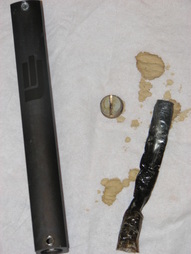 Water-logged Mezuzah Water-logged Mezuzah Note: The word Mezuzah always refers to the scroll, and the case or cover is always referred to as such. Even if your Mezuzah is written properly and according to Halacha, being that it is a very delicate item it needs to be treated gently and cared for properly. It may seem obvious, but many people are unaware of the issues at hand. Every Mezuzah should be wrapped in a protective wrapping before it is placed in a case. Wax paper, parchment paper, Saran Wrap holds moisture in, which may cause damage to the Mezuzah as well it melts in very hot temperatures onto and ruin the Mezuzah. A Mezuzah case that does not necessitate the Mezuzah to be rolled tightly is best. This will place less stress on the letters and help prevent the ink from cracking. Also, when there is sufficient space inside there will be less chance of the Mezuzah tearing or crumpling when it is put in and taken out. Never force a Mezuzah into its case if it does not get ruined going in there is a big chance it will be stuck in and get ruined coming out. Outdoor Mezuzos A Mezuzah affixed outdoors must be placed in a sealed plastic Water proof Mezuzah cover or a specially treated wood case which opens only from the bottom with a plug or screw. A water proof cover is a solid piece of plastic with only one opening on the bottom and it is sealed airtight with a rubber cork. This will help prevent rain from seeping in. Care should be taken to prevent water from being directed toward the case from the bottom, for example with a sprinkler. If a Mezuzah will be in direct sunlight, use a solid white or silver-colored case in order to reflect the light. Clear plastic cases are not recommended for use in direct sunlight, as the Mezuzah may get burn spots or dry out and crack[ Dark-colored cases will get very hot and may damage the Mezuzah. As well it is important to avoid metal covers, the reason for this is two fold 1) The Das Kedoshim writes as follows; The reward for fulfilling the Mitzvah of Mezuzah is long life as the Posuk says “Leman Yirbu Yimeichem” and weapons of war are made from Barzel – Metal therefore it’s not proper to put a Mezuzah in a material that cuts life short. 2) Metal tends to absorb the temperature much more than plastic, in the winter it becomes ice-cold and in the summer it gets scolding hot,which is very damaging for a Mezuzah. (think about it would you touch a metal railing during the winter months without gloves? or a metal railing in the heat of a summer day? I think not! ) Convenience in Affixing Mezuzos Fragile Mezuzah cases, such as those made from silver, glass, ceramics and Polymer clay must be affixed with extreme care. If they are not affixed gently they may crack or break. Be sure not to tighten the screws or nails tightly as the pressure can also cause damage. It is advisable to use screws, rather than nails, to affix a Mezuzah because it will be easier to take down later and there is less risk of causing damage to the case and the door frame when removing nails. Double-sided foam tape may be used to affix a Mezuzah case as long as the case does not have a removable back. This is an excellent option if you do not want to make holes in the door frame or will have difficulty making holes. Cellophane or masking tape should preferably not be used if the case will not be firmly affixed. Many people dread removing and re-affixing their Mezuzos when it is time to have them checked. To avoid this feeling it is suggested to use cases which unscrew or unplug from the top or bottom. With these cases one only needs to remove the plug and possibly one screw to remove and reinsert the Mezuzah. If a Mezuzah is stuck inside its case, carefully bang the case against another object to loosen it. Alternatively, you can remove the Mezuzah by grasping the very bottom of it with a blunt tweezers, taking care not to damage the lettering. In order to be certain that the Sha-dai remains facing forward inside an opaque case, the Mezuzah should be rolled loosely enough so that it cannot rotate but tightly enough for it to be easily removed. Alternatively, it can be taped into place. If you use a clear case or one with a window for the Sha-dai, you will always be able to see if it is facing forward. Some Mezuzah cases are made of a clear glass or plastic tube resting in a wood or metal base. The tube of this type of case often turns, causing the Sha-dai to shift this is a proplem Simply twist it back into place as necessary and tape the back of the tume to post When cleaning a Mezuzah’s outer case it can be lightly dusted. But never use liquid cleaners because they may seep within the case and damage the parchment scroll. The Kitzur Shulchan Aruch states that Mezuzos and Tefillin should optimally be checked on a yearly basis. If that is not possible then Mezuzos must be checked at least every three and a half years. By checking your Meuzuzos regularly you will prevent serious problems from occurring as well as a potential big expense of having to replace your Mezuzos. If the letters start to grey or if the letters and crowns begin to form a small crack and break this will cause the Mezuzah to become not Kosher, if caught in time it can be fixed, however if it goes years without attention chances are it will be too late the breaks will be to big to be able to fixed and it will have to be replaced. As well unfortunately there are Mezuzos that were Not Kosher from the get go, and the more times they are checked the more chances you have to finding the problems.
1 Comment
|
Categories
All
AuthorRabbi Kass was ordained by Rabbi Yisrael Meir Lau, former Ashkenazik Chief Rabbi of Israel. He is certified as a Sofer for both Kesivah and Hagoah by one of the leading experts in Safrus, Rabbi Avrohom Tzvi Vosner, Rav of the Vad Mishmeres Sta”m. Archives
March 2018
|
What our clients say about us: |
To enhance our service quality, we operate on an appointment-only basis.
Please contact us to make an appointment. $12.99 Flat rate shipping! Mezuzahs, Tefillin & Accessories! |
|






